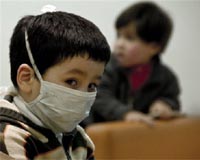| . |  |
. |
Sydney (AFP) June 17, 2009 Australia raised its swine flu alert level Wednesday as the number of cases nationwide climbed above 2,000, Health Minister Nicola Roxon said. Roxon said the alert level would move to the newly-created "protect" level, meaning only the most vulnerable would receive anti-viral treatments such as Tamiflu and those with mild symptoms must rely on over-the-counter medicines. "'Protect' recognises that the A(H1N1) swine flu is not as severe as originally envisaged," she told reporters. "This disease, as we know, is mild in most cases, severe in some and moderate overall. The overwhelming majority of patients are making a rapid and full recovery." Swine flu's spread in Australia was cited as a factor in last week's World Health Organization (WHO) decision to declare the first global pandemic in 40 years. Roxon said the national tally was 2,026, with 1,210 in the hot-spot Victoria, although that state's tally has not been updated for several days. She said 53 people had been hospitalised because of the virus, with three in intensive care, stressing that most patients had pre-existing conditions such as respiratory conditions or morbid obesity. While some states will immediately move to the new level, others would take some days to implement new measures, with the protect status active scheduled to be in place nationwide by Friday, Roxon said. Early treatment will concentrate on vulnerable patients such as pregnant women and those with medical conditions. Anyone with mild swine flu will be asked to place themselves in voluntary quarantine but, because of the relative mildness of the virus, will not face compulsory isolation. Canberra Hospital infectious diseases specialist Sanjaya Senanayake said the fatality rate from swine flu had been about one percent globally, much lower than the 61 percent rate from the A(H5N1) bird flu. "The virus, despite being both novel and infectious does not seem particularly lethal," he told national news agency AAP. "This last fact has probably surprised many. "Before this outbreak, many experts would have assumed that an influenza virus that crosses the species barrier and is capable of sustained human to human transmission would undoubtedly be highly lethal." But University of Sydney researcher Robert Booy said there was no room for complacency when dealing with swine flu. Booy said many vulnerable people may now defer seeking medical treatment because the flu initially appeared mild. "If they stay at home for three or four days and then think 'Oh no I'm getting worse' and seek attention from their GP, it is too late for them to be treated with the antiviral drugs that are available," he said.
Hong Kong reports 54 new cases of swine flu "The new cases involved 32 female and 22 male aged between three and 55. All of them are in stable condition and have been admitted to public hospitals for medical treatment," said a spokesman for the Department of Health. There have been no deaths from the A(H1N1) virus in Hong Kong. Last week, authorities ordered all primary schools in the city to be closed for two weeks after the first cluster of local swine flu cases was found. When the city discovered its first case, at the start of last month, it started a week-long quarantine of around 300 guests and staff at a hotel where the carrier had briefly stayed. Hong Kong is on edge about infectious diseases following the outbreak of the SARS virus in 2003, which killed 300 people here and a further 500 around the world. The World Health Organization has raised its global alert to a maximum six, saying swine flu has reached pandemic status because of its geographical spread, and warned countries that already have large numbers of cases to prepare for a fresh wave of infections. Swine flu has infected 35,928 people in 76 countries since the disease was first uncovered in late March, and 163 people have died, according to the latest WHO data. Share This Article With Planet Earth
Related Links Epidemics on Earth - Bird Flu, HIV/AIDS, Ebola
 Flu Hit South America Sees New Strain Emerge
Flu Hit South America Sees New Strain EmergeBuenos Aires (AFP) June 16, 2009 The swine flu deaths of two people in Argentina and a mutation of the H1N1 virus detected in Brazil have added to fears that South America is entering a harsh winter beset by the flu pandemic. While big pharmaceutical firms are ramping up efforts to mass-produce a vaccine for H1N1, they are still months away from having enough stocks -- too late for the Southern Hemisphere's winter flu ... read more |
|
| The content herein, unless otherwise known to be public domain, are Copyright 1995-2009 - SpaceDaily. AFP and UPI Wire Stories are copyright Agence France-Presse and United Press International. ESA Portal Reports are copyright European Space Agency. All NASA sourced material is public domain. Additional copyrights may apply in whole or part to other bona fide parties. Advertising does not imply endorsement,agreement or approval of any opinions, statements or information provided by SpaceDaily on any Web page published or hosted by SpaceDaily. Privacy Statement |